Our Arklahoma Heritage: Festus Orestes Butt-Lawyer, legislator, and mayor of the Ozarks
- Dennis McCaslin

- 1 day ago
- 5 min read


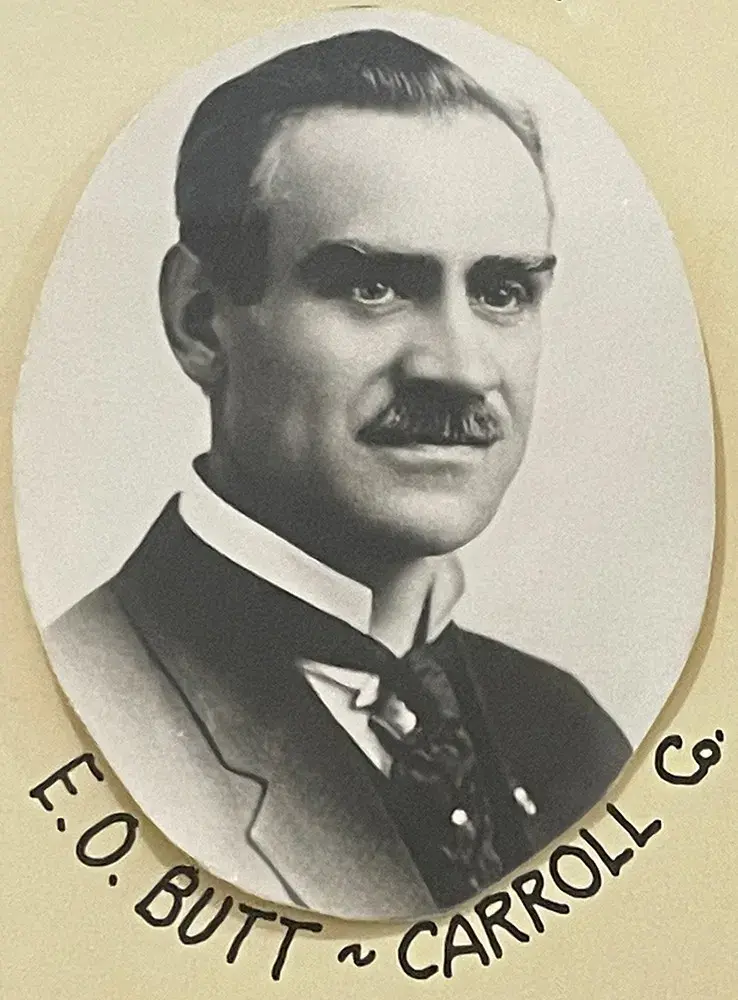
In the rugged terrain of northwest Arkansas, where the Ozark Mountains hold stories of perseverance and adaptation, few individuals stand out like Festus Orestes Butt.
Born in 1875 on the open plains of Illinois, Butt’s life stretched across nearly a century—from the post-Civil War era to the brink of the Space Age. A self-taught lawyer, a compelling speaker in the statehouse, and a three-term mayor of Eureka Springs, Butt reflected the determination and ambition of a growing nation.
Yet his journey included challenges: a bribery conviction that tested his character and ultimately reinforced his reputation for recovery. At 97, when he passed in 1972, Butt left a lasting mark on Arkansas politics, law, and community leadership.
Festus Orestes Butt was born on February 3, 1875, near Lovington, Illinois, to William Alvin Butt Sr., a Union Army veteran and farmer, and Anna Marie Weaver Butt, a dedicated homemaker.
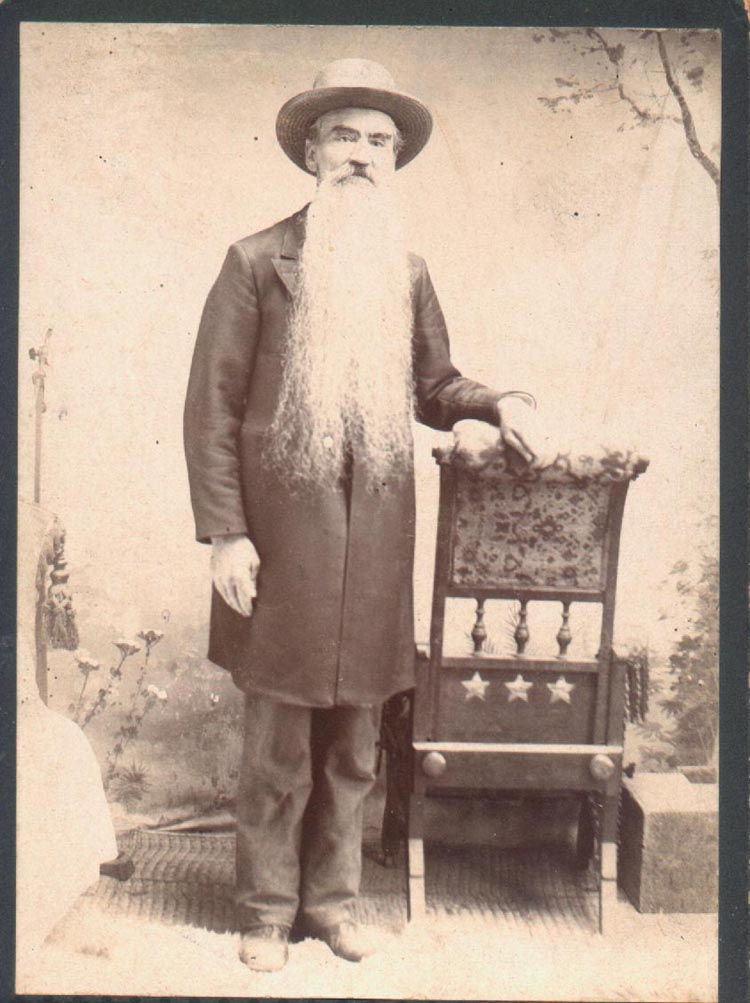
William, born in 1843 in Bethany, Illinois, had endured the Civil War’s 114th Illinois Infantry, surviving conflicts that shaped a generation. Anna, born in 1848 in Ohio, managed the household through the uncertainties of rural life.
The family, including siblings like Mary Ellender "Ella" Butt Harbert (1867–1905), Sarah Ernestine "Tina" Butt Ramsey (1872–1948), William Alvin Butt Jr. (1883–1950), and Annie Alberta Jane Butt Littrell (1888–1979), moved to Carroll County, Arkansas, in 1886, seeking fertile land and new prospects in the untamed Ozarks.
An infant son died in 1892, a stark reminder of the era’s hardships.
Young Festus, often called "Fes" or "F.O.," grew up in Green Forest, a town emerging through timber and railroads. Without formal college education, he studied law by lamplight, teaching school at 17 under the guidance of local mentor W.F. Pace.
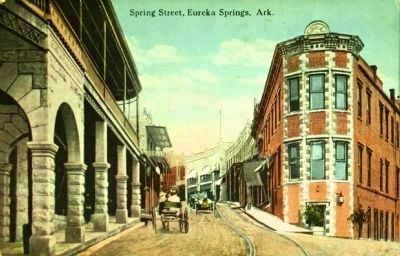
In 1894, at just 19, Butt passed the bar exam before the Carroll County circuit judge--a feat requiring special legislative approval to waive his age. The Arkansas Supreme Court granted his license in 1896, beginning a 75-year career that earned him the title of dean of the Arkansas Bar by 1960.
Butt’s early legal work in Green Forest highlighted his sharp mind and community involvement. I

In May 1901, as trustee for the Green Forest guarantee committee, he settled payments to railroad attorney O.W. Watkins for right-of-way acquisitions, aiding economic growth. That July, he successfully defended client Price Jones in city court, arguing that "fish was not meat" under a local ordinance, securing an acquittal for unlicensed sales.
His role expanded to finance; in August 1901, Butt joined the board of directors for the newly opened Bank of Green Forest, alongside figures like W.R. Sneed and J.E. Franklin. These positions established him as a key figure in a county still recovering from Reconstruction.
Amid professional achievements, romance emerged unexpectedly. In a 1971 family interview, Butt recounted his courtship of Essie Mae Cox. Essie, born April 28, 1879, in Carroll County to Andrew J. Cox and Emily Parlee Anderson, caught his attention during a buggy ride westward from Green Forest toward Berryville.
Passing a grand apple tree in full spring bloom, Essie mentioned she’d like to wed beneath it.
Seizing the moment, Butt proposed, and she agreed.

They drove to Berryville’s courthouse square, where old teacher and Circuit Clerk Joe Maples greeted them. Maples brought County Judge Bert Pittman, who agreed to officiate, but Essie insisted on the apple tree.
With licenses secured, the group--Butt and Essie in their buggy, Pittman and Maples following--returned to the farmhouse. The homeowner, apron discarded, hosted the ceremony under the tree’s wide branches, with a few locals as witnesses.

No feast followed; the couple returned to Green Forest, announcing their union days later in the Green Forest Tribune on June 1, 1901. Essie’s father, Andrew, warmly approved, praising Butt as a suitable match.
The apple tree remained a symbol of their union for decades.
The couple settled into Butt’s self-built six-room cottage in Green Forest, with help from a Methodist preacher.
They later moved to Eureka Springs, where their seven children were born: John Kenneth (1902–1949), Annie Kathleen (1904–1994), Robert Lee (1906–1959), Dorothy Deane (1909–1940), Dr. William Jackson (1912–1977), Joseph Volney (1914–1980), and Thomas Franklin (1917–2000).
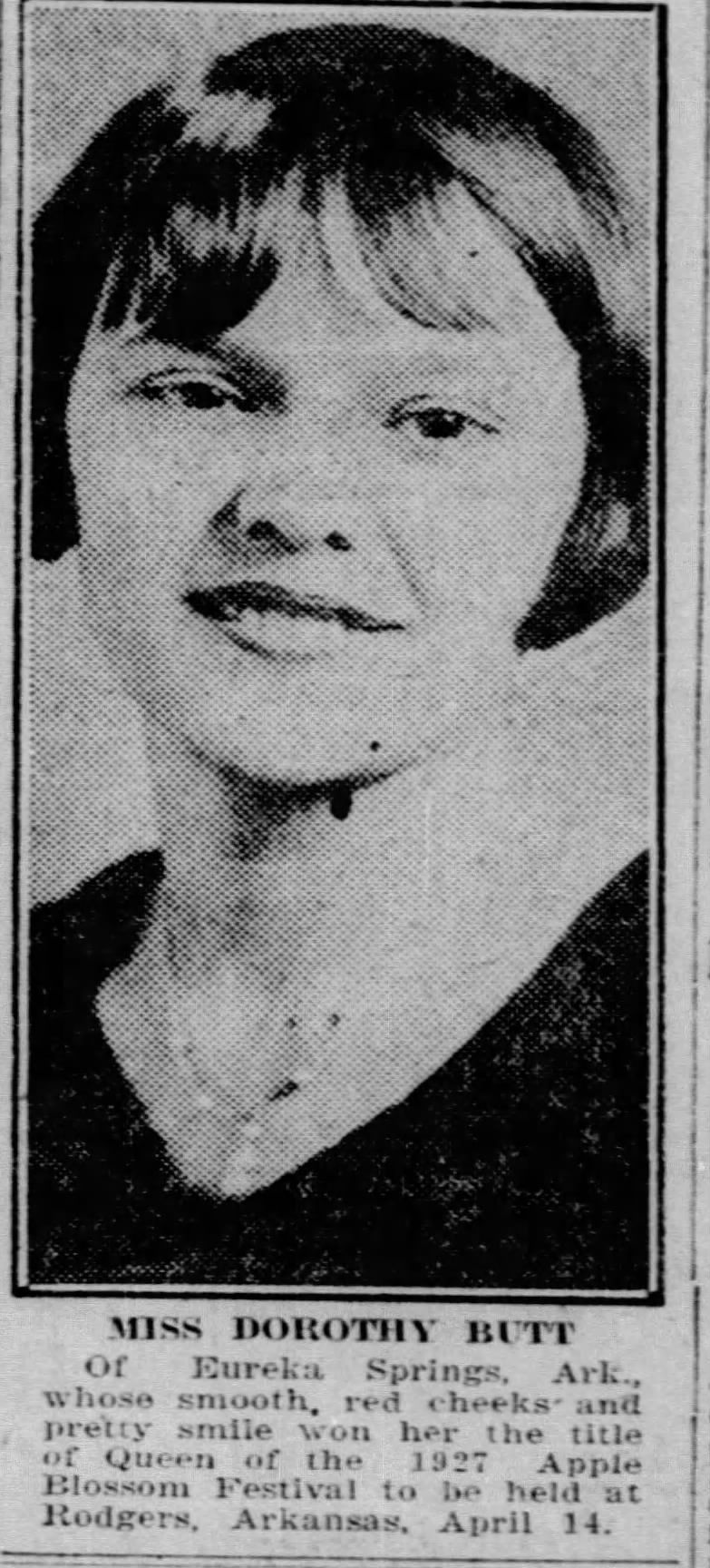
Among them, daughter Dorothy Deane Butt gained local recognition when her "warm smile, rosy cheeks, and gentle demeanor" earned her the title of Queen of the 1927 Apple Blossom Festival, held at Rogers, on April 14 of that year.
Christened in 1892 among the Disciples of Christ in Harrison, Butt turned his speaking skills to public service. Elected to the Arkansas House in 1897 at age 22--again with an age waiver--he served two terms (1897–1900), advocating for education and infrastructure.
In 1901, he won a Senate seat for Carroll and Madison counties, serving until 1906 and rising to president pro tempore.
A 32nd-degree Mason, Odd Fellow, and Knight of Pythias, Butt was praised for his eloquent delivery and clear language.
But 1905–1906 brought trouble. Amid the "Boodle Scandal"--a corruption case in the Arkansas General Assembly over State Capitol funding--Butt was accused of bribing Senator Reuben R. Adams with $100 to support contractors Caldwell & Drake.

Prosecutor Lewis Rhoton exposed the wrongdoing. Tried separately from peers like Senator Alonzo Webb Covington (acquitted), Butt was convicted in August 1906. Sentenced to two years in prison and a $200 fine, he appealed unsuccessfully to the Arkansas Supreme Court.
Family accounts suggest two rival attorneys falsely accused him; one later recanted, leading to a full pardon after about a year. The scandal, part of broader reforms, challenged but did not derail him.
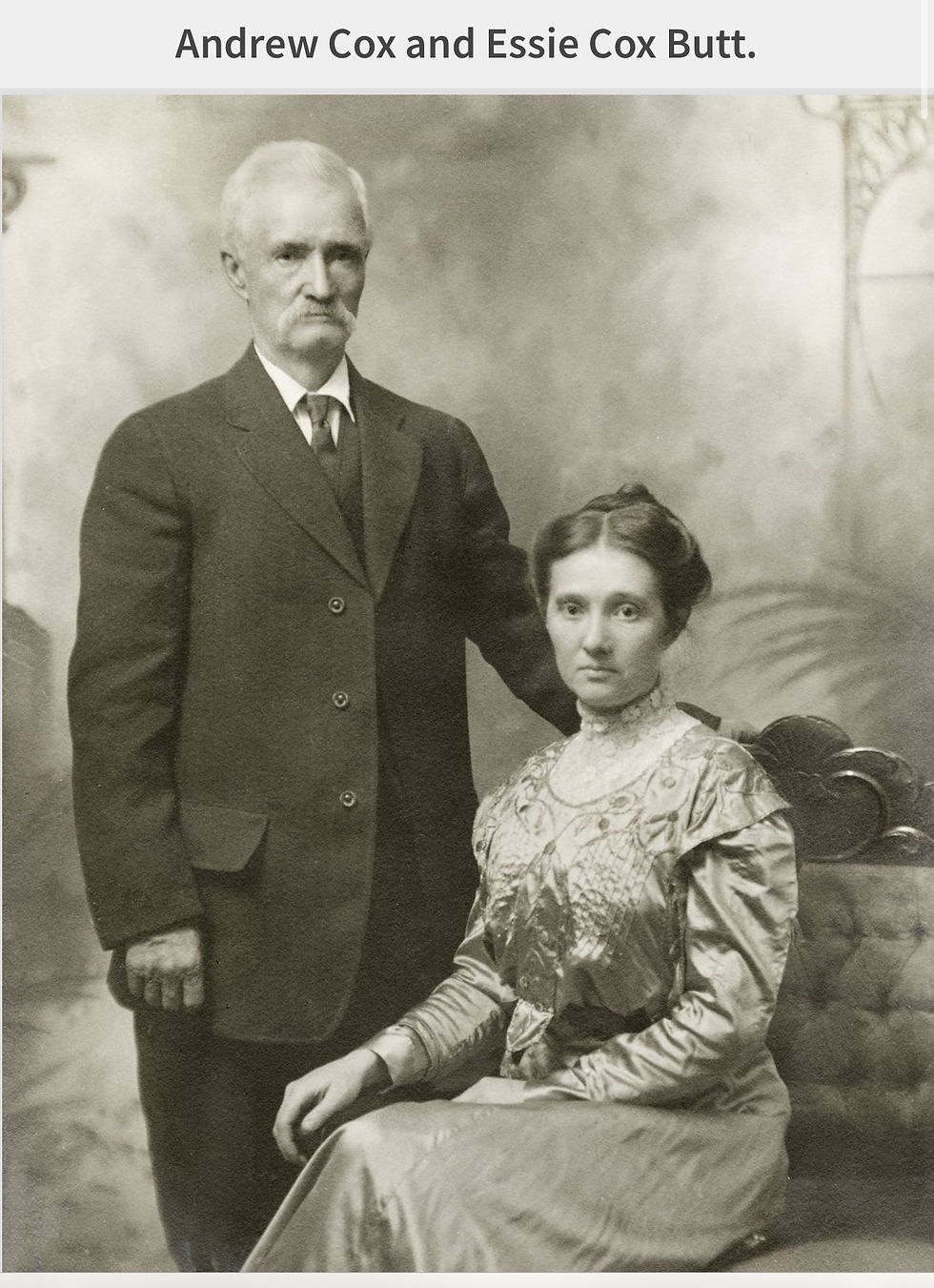
Undeterred, Butt rebuilt. He served as Carroll County schools superintendent and returned to the Senate in 1927–1930. As a 1917–1918 Constitutional Convention delegate, he helped shape Arkansas’ framework. In 1911, campaigning as the "candidate of the People Who Believes in a Dry Progressive City," he won Eureka Springs' mayoralty,
serving terms in 1911–1912, 1916–1917, and 1920–1921. He secured perpetual first-class city status via 1913 legislation, maintaining Eureka’s standing despite population shifts.
During World War II, with son John (a Navy officer) absent, the bar elected Butt chancellor and probate judge for the 13th Chancery Circuit in 1942–1943.
Banking strengthened his influence: executive roles at First National Bank of Eureka Springs (later First State Bank), Green Forest's bank, and Berryville's Peoples Bank.
A lifelong Freemason, Butt kept his Eureka Springs office st 15 Spring Street active into his 90s, admired for his insight and service.
A historical marker at his former law offices reads: "Beloved for his oratory, wisdom and service to community.
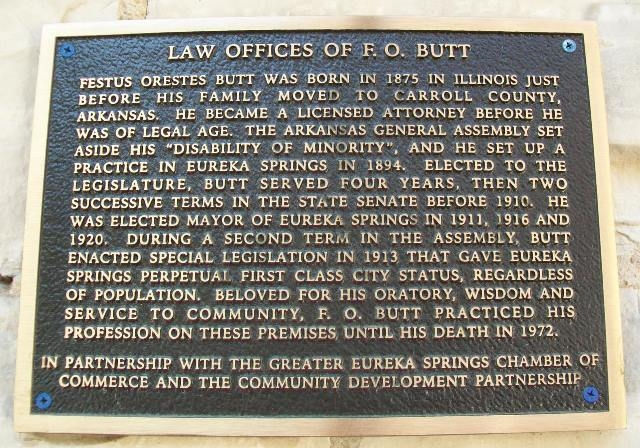
Festus Orestes Butt died June 30, 1972, in Fayetteville, outliving most peers.
His grandson, Tom Butt, later served as Richmond, California's mayor, continuing the family legacy. Butt’s life—from his apple-tree wedding to his recovery from scandal—mirrors Arkansas’ own: tough, redemptive, and grounded in the Ozarks.
As the Eureka Springs Times noted in 1911, he was a man of "wonderful executive ability," whose election as mayor proved wise.



